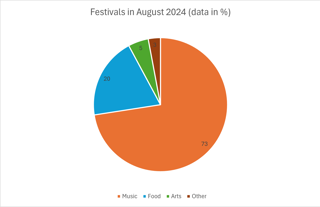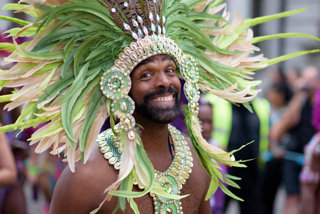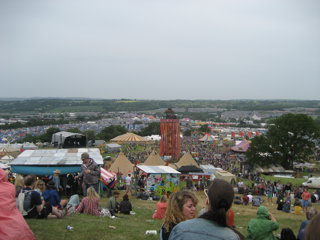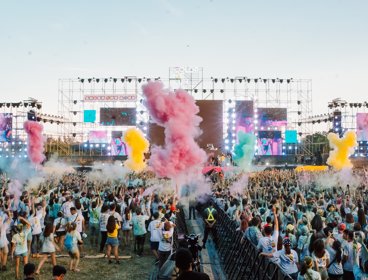Introduction
With longer daylight hours, warmer weather and school holidays, summer is the perfect time of year to go outdoors and experience the many festivals the UK has to offer. Festivals, typically annual events, celebrate shared interests such as food, music, film, books, and more.

Figure 1: Pie chart showing the range of festivals proposed to take place in the UK in August 2024.
Data adapted from Efestivals.co.uk © RGS
Throughout 2024, there are thought to be 204 music festivals in the UK alone. In addition to these, numerous food, art, and religious festivals offer something for everyone to enjoy. Festivals, by their nature foster a sense of inclusivity and community by bringing together individuals who share common interests whether this is a passion for a specific music genre, a love of food, an appreciation of the arts or a shared interest in spiritual or cultural traditions. These shared pursuits can create an atmosphere where people can connect generating lasting memories together.
Celebrating culture and diversity
Festivals can be a medium in which cultural traditions are celebrated and kept alive outside of their country of origin. This is particularly poignant within younger generations of diaspora groups who have settled in a country with a different cultural heritage of their own.
The Notting Hill Carnival is an excellent example of this. Initially started in the 1960s as a children's street party to bring communities together, the festival which takes place over the August Bank Holiday weekend has blossomed into a celebration of diverse heritages. It attracts over two million visitors each year.

Figure 2: Dancer from the Notting Hill Carnival © Torsten Reimer Flickr
Those who have experienced the carnival have witnessed a vibrant display of predominantly British African Caribbean and British-Indo Caribbean culture. The atmosphere is alive with music, dancing, and the aromas of traditional food. Recognised as one of the largest street festivals in the world, it remains a community-led event, exemplifying how communities can come together to share and celebrate their cultural heritage through festivals.
Similarly, Pride events which mainly take place all over the UK throughout the summer months aim to promote diversity, inclusion and education of the LGBTQ+ community. The largest Pride event in the UK takes place in Brighton and Hove at the beginning of August. The ‘Fabuloso: celebrate your true colours’ festival is a weekend long celebration full of parades, music, dancing and parties. Attracting an estimated 500,000 visitors over the weekend and boosting the city’s economy by £22.5 million, this event along with other Pride festivals sets to celebrate the diversity of communities across the nation.
Impacts of festivals
By celebrating common interests, festivals have the power to bring together people from diverse backgrounds, fostering a sense of unity and belonging. This helps to break down social barriers and promote cultural understanding. However, with the average festival expenditure in 2024 ranging between £566 and £923 there is an argument that such experiences are only achievable to those with the financial means to attend, preventing a complete mix of socioeconomic backgrounds.
Festivals attract visitors from across the UK and in some cases (e.g. Glastonbury) the sphere of influence is global. As a result, festivals are big business. The economic impact forecast for UK festivals between 2024 and 2029 predicts a revenue of £4.8 billion, employment for over 35,000 people, and involvement of 3,800 businesses annually. However, given the rising costs of goods and services, the overall cost of the festival will most likely keep increasing, again limiting the number of people who can enjoy them. In addition, the seasonal nature of festival employment does not provide a steady income for those who work within this industry.
Festivals typically require extensive resources including energy, water and materials. In addition, the amount of waste generated can create a large environmental headache for organisers. The energy needed to power lights, sound systems and other infrastructure as well as the transportation of festival goers increase the carbon footprint of the area even for a short period of time.

Figure 3: View of Glastonbury showing some of the impacts of festivals © Malcom Murdoch Flickr
Mitigating the impacts of festivals
With growing awareness of the negative environmental and economic impacts of festivals, organisers have started to adopt more sustainable and inclusive practices. This includes providing ample water filling stations to reduce the reliance on single-use plastic bottles, setting up dedicated recycling stations, and serving food in recyclable packaging.
Involving the community throughout the event also ensures that they serve the very people they represent whilst also reinvesting a proportion of the generated income back into the area. Additionally, initiatives such as 50% of the full ticket price for low-income households as seen at the Brighton and Hove Pride event, can help make festivals more accessible to those who might not ordinarily be able to attend.
Further reading


